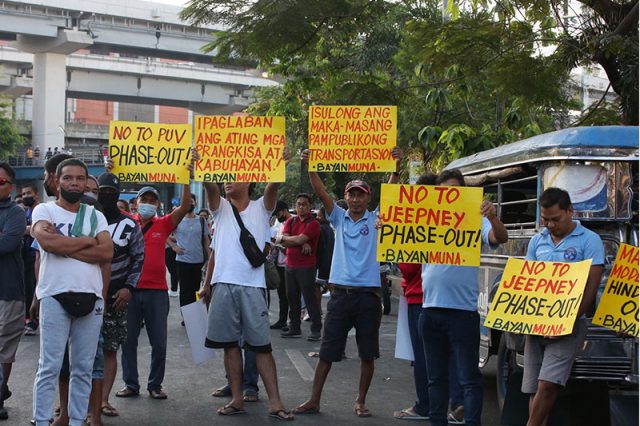
The transportation department was reminded of the Filipinos’ constitutional rights to assemble and free speech following threats to revoke franchises of public utility vehicles participating in the protests.
Transportation Undersecretary for Legal Affairs Reinier Yebra on Saturday warned that those joining the transport strikes could face both administrative and criminal sanctions.
“Bukod po doon sa kumbaga may mga violation, maaari po silang kasuhan kasi kapag, halimbawa, sila ay nanakit o kaya ay nanira ng property, iyon po ay ipinagbabawal. Iyon po ay may mga katumbas na criminal penalties,” he said in a news forum.
“Pero bukod po doon mayroon din hong tinatawag na mga administrative penalties,” Yebra added.
“Kasi kung kayo po ay franchise holder, mayroon po kayong obligasyon na magbigay ng serbisyo sa publiko. Kapag iyan po ay inyong hindi ginawa at imbes ay nag-welga o kaya ay kumbaga, nag-violate iyong conditions of your franchise, ay pwede pong i-revoke iyan,” he said.
Yebra added that they want to emphasize to the operators and drivers that a franchise is not a right but a “mere privilege that the state can take back anytime” if they don’t comply with the terms.
“In other words, there are many mechanisms to protect our commuters both on the criminal and administrative aspects. We’re supported by the law on this,” the Bar 2009 topnotcher added.
Various transport groups are holding mass demonstrations from March 6 to 12 in response to the government’s pending implementation of the Public Utility Vehicle (PUV) Modernization Program.
Operators of traditional jeepneys and UV Express are expected to join cooperatives by December 31 to supposedly help them buy modernized vehicles that cost up to P2.8 million per unit.
If they fail to do so, they won’t have their franchises renewed.
Major transport group PISTON said that the program would kill the livelihood of small-time jeepney operators who cannot afford to join cooperatives.
They added that a modern minibus costs around P2.4 million to P2.8 million per unit, while a traditional jeepney only costs P200,000 to P600,000.
Others said there would be an increase to the minimum fare hike, a blow to the riding public already dealing with a staggering 8.7% inflation rate.
Meanwhile, Yebra’s words against the protesters did not sit well with some Filipinos who reminded him of their constitutional rights in relation to his comments on mass demonstrations.
“Sanctions for exercising their constitutional rights? Anong kab*b*han ‘to???? The weaponization of the law to silence dissent is a grave threat to the foundations of a democratic society,” a Twitter user said.
Others cited articles in the 1987 Philippine Constitution that talked about free speech and the right to assemble.
“Article III, Section 4 of the 1987 Philippine Constitution. @/DOTr, READ!!” a Twitter user said, sharing a screengrab of the cited section.
She also included the hashtag “#NoToJeepneyPhaseout” in her post.
This was also cited by Muntinlupa City Mayor Ruffy Biazon.
“Article III, Sec. 4 of the Philippine Constitution. I believe this upholds the right of the transport strikers,” he tweeted on Monday.
“We at the LGU [local government unit] will just take action to alleviate mobility woes of our constituents during this time,” Biazon added.
Article III Section 4 reads:
No law shall be passed abridging the freedom of speech, of expression, or of the press, or the right of the people peaceably to assemble and petition the government for redress of grievances.
Article III, Sec. 4 of the Philippine Constitution. I believe this upholds the right of the transport strikers. We at the LGU will just take action to alleviate mobility woes of our constituents during this time. pic.twitter.com/Et4DOBx425
— Ruffy Biazon (@ruffybiazon) March 6, 2023
Twitter @daledalechrist, editor-in-chief of student publication “Scire,” also cited a series of provisions from the Philippine Constitution.
“Art. III Sec 4. No law shall be passed abridging the freedom of speech, of expression, or of the press, or the right of the people peaceably to assemble and petition the government for redress of grievances,” he wrote.
“Sec 8. The right of the people, including those employed in the public and private sectors, to form unions, associations, or societies for purposes not contrary to law shall not be abridged,” user @daledalechrist added.
“Art II. Sec 10. The State shall promote social justice in all phases of national development,” he continued.
“Sec 11. The State values the dignity of every human person and guarantees full respect for human rights,” user @daledalechrist further said.
Both the last two provisions are state policies under the Philippine Constitution’s Declaration of Principles and State Policies.
Meanwhile, majority of Biazon and the others cited Section 4 of the Philippine Constitution’s Article III, which is the Bill of Rights.
The Bill of Rights establishes the relationship of the individual to the State and defines the rights of individuals by limiting the lawful powers of the State.
It is said to be one of the most important political achievements of Filipinos.
The Philippine Constitution is the supreme law of the land which establishes the structure, policies, roles, and duties of the government, as well as the fundamental rights of the citizens.
Laws, rules, and regulations that are not consistent with it can be declared by courts to be unconstitutional, void, and of no force and effect.









